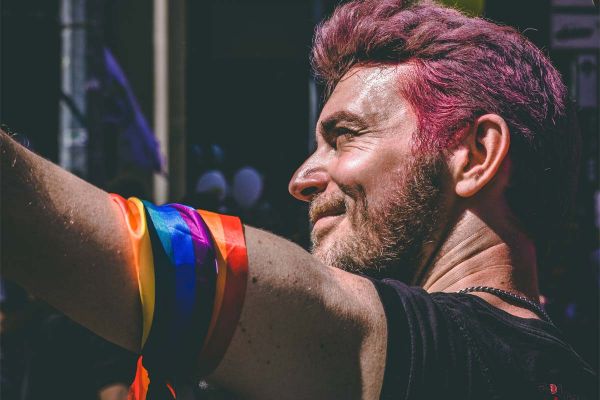 The LGBTQ+ community has a long-documented history of heavy substance use and abuse. Today, an estimated 4.5% of the U.S. population identifies as LGBTQ+, but over 7 million LGBTQ+ persons struggle with substance use disorders including addiction to alcohol and drugs. Lesbian, Gay, Bisexual, Trans, and Queer persons are more vulnerable and more susceptible to substance abuse and addiction thanks to a variety of factors including culture, stigma, trauma, and shame. LGBTQ+ persons are as much as four times as likely to suffer from a substance use disorder as a straight or cis person.
The LGBTQ+ community has a long-documented history of heavy substance use and abuse. Today, an estimated 4.5% of the U.S. population identifies as LGBTQ+, but over 7 million LGBTQ+ persons struggle with substance use disorders including addiction to alcohol and drugs. Lesbian, Gay, Bisexual, Trans, and Queer persons are more vulnerable and more susceptible to substance abuse and addiction thanks to a variety of factors including culture, stigma, trauma, and shame. LGBTQ+ persons are as much as four times as likely to suffer from a substance use disorder as a straight or cis person.
Understanding the complex interplay between sexuality and gender roles in modern society, alcohol and substance abuse, and mental disorders could help you or a loved one to get treatment. The LGBTQ+ community is vulnerable and understanding that is critical to finding and going to the right treatment.
Why is the LGBTQ+ Community Vulnerable to Substance Abuse?
Substance use disorders are complex mental disorders compromising behavioral disorder and chemical dependency. They link to complex patterns of vulnerabilities like trauma, brain development, reckless behavior, exposure, and self-medication – ultimately culminating in an individual who uses a substance to feel good or better until the point when they use it to not feel bad. The LGBTQ+ community is especially prone to most of these risk factors, through childhood and adult trauma, through social stigma and shame, familial rejection, using substances as a coping mechanism, and the strong culture of drinking and drugs associated with many LGBTQ scenes.
Trauma – LGBTQ+ persons are significantly more likely to experience childhood and adult trauma than straight and cis-persons. This is important, because trauma experiences are directly linked to vulnerability to addiction. The Adverse Childhood Experiences study directly links incidents of trauma before the age of 16 to increased vulnerability to addition, mental health disorders, growth and development disorders, risk-taking behaviors, and developing poor social and behavioral coping mechanisms. LGTBQ+ persons are more at risk to these traumas because they experience stigma, family rejection, hiding personality and gender or sexuality, internalized homophobia, domestic violence, bigotry, and abuse. As adults, much of this does not go away, leading adults to lean on coping mechanisms including substances, to isolate themselves, and to heavily involve themselves with “feel-good” party scenes where abusing drugs and alcohol are the norm. One study suggests that 70% of LGBTQ+ people in rehab have undergone serious trauma, which is only exacerbated by trauma experienced while under the influence. Some of these traumas include:
- Increased exposure to domestic violence
- Self-harm and suicidal ideation related to stigma, homophobia, and family rejection
- Social stigma and hiding gender and sexuality
- Social isolation and “not fitting in”
- Increased exposure to domestic violence, sexual assault, assault, and homelessness following substance dependence
- Lack of resources for mental health assistance and help in the context of LGBTQ+ issues
These factors both increase exposure to drugs and alcohol and therefore the likelihood of addiction and increase risk factors for addiction, making it extremely likely to develop a substance use disorder.
 Mental Disorders – Trauma, especially Adverse Childhood Experiences, directly play into an increased risk of developing mental health disorders. LGBTQ+ persons are also significantly more exposed to trauma that could result in PTSD, social isolation contributing to anxiety and depression, but also increased risks of dysphoria, bipolar disorder, borderline, and schizophrenia. Some estimates suggest that as many as 60% of LGBTQ+ individuals struggle with mental health disorders, especially depression and suicidal ideation.
Mental Disorders – Trauma, especially Adverse Childhood Experiences, directly play into an increased risk of developing mental health disorders. LGBTQ+ persons are also significantly more exposed to trauma that could result in PTSD, social isolation contributing to anxiety and depression, but also increased risks of dysphoria, bipolar disorder, borderline, and schizophrenia. Some estimates suggest that as many as 60% of LGBTQ+ individuals struggle with mental health disorders, especially depression and suicidal ideation.
Mental health disorders directly correlate to increased risks of substance use disorder by increasing vulnerabilities through stress, trauma, and mental state. Individuals with mental health disorders are more likely to rely on drugs and alcohol as coping mechanisms or to temporarily feel better.
Exposure – Many LGBTQ activities and scenes heavily involve drugs and alcohol. Gay bars, raves, Pride, and other festivals are sometimes heavily reliant on drugs and alcohol. The history of persecution by police through most of history has meant that LGBTQ scenes already had something to hide, already had to go through great lengths to be secretive and were already hunted by the police. This made them ideal for selling and using drugs, making substance abuse a large part of many “underground” scenes. Today, that tradition often continues, leading many young people to involve themselves with substance abuse as a means of fitting in.
Different Risks Necessitate Different Treatment
 While many members of the LGTBQ+ community seek out treatment for substance use disorders, traditional programs don’t always provide the needed care and support. One study shows that 21-24% of LGBTQ+ persons have been denied medical care, with a further 70% reporting stigma and homophobia or bias from staff or treatment programs.
While many members of the LGTBQ+ community seek out treatment for substance use disorders, traditional programs don’t always provide the needed care and support. One study shows that 21-24% of LGBTQ+ persons have been denied medical care, with a further 70% reporting stigma and homophobia or bias from staff or treatment programs.
LGTBQ+ people face very specific issues relating to stigma, homophobia, rejection, social isolation, and low self-esteem. Many also face body issues which must be diagnosed and dealt with. And, for the estimated 60% of LGBTQ+ people with co-occurring disorders, it’s critical to source treatment for dual-diagnosis treatment where both the substance use disorder and a mental health disorder can be treated at the same time.
LGBTQ+ Focused Programs – Many rehab centers increasingly offer LGBTQ+ focused programs, creating safe spaces for individuals who might fear stigma, violence, and harassment in a traditional clinic. Studies show that attending an LGBTQ+ focused program improves recovery outcomes over going to a general program, especially when the program is run by individuals who understand the complexity and depth of issues faced by their patients.
Personalized Treatment – Personalized treatment allows psychologists and counselors to tackle specific instances of behavior, trauma, and history that might contribute to substance abuse. Modern drug and alcohol treatment heavily relies on behavioral therapy, which involves recognizing the root issues behind substance abuse and correcting those behaviors and patterns. The approach, treatment, and even therapies used should depend on the individual and their problems.
Support – Actively receiving support and an open ability to talk about life and life problems in the context of sexuality and gender can be powerful and reaffirming, and an important step in the right direction of recovery. It’s critical that anyone moving into rehab be able to receive this support, which means seeking out open-minded and openly supportive rehab centers.
If you or a loved one is struggling with a substance use disorder, it’s important to seek out treatment in the context of gender and sexuality. LGBTQ+ communities struggle with stigma, prejudice, violence, cultures of drug and alcohol abuse, and increased exposure to trauma through family and loved ones, at the hands of strangers, and because of those drugs and alcohol. When someone might be using alcohol to cope with losing family members or a career because of their sexuality, it’s critical that rehab and treatment be able to tackle those complex emotional and mental problems, rather than simply treating the symptoms of substance use disorder.
While almost 40% of the LGBTQ+ community will have a drug or alcohol problem at some point in their lives, there is help, and you can recover. Many communities now focus on offering sober and drug free support and after rehab, more rehab centers are offering LGBTQ+-focused treatment, and counselors are increasingly offering support for the diverse and complex needs of individuals who have experienced trauma because of who they are. If you or a loved one is abusing a substance, there are options, and they will help.
Contact us today at 800-931-9884 for a free assessment, and more information about our drug and alcohol treatment center in the Los Angeles area.